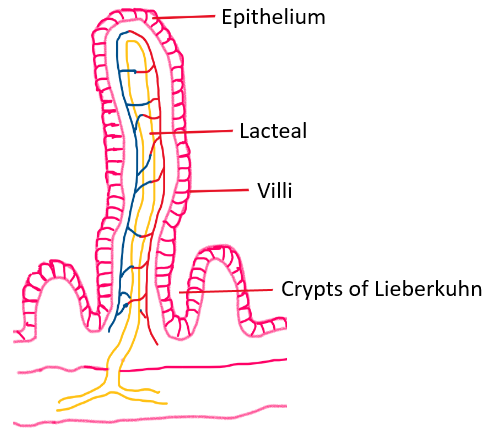
‘Crypts of Lieberkühn’ are found in
(a) Gallbladder
(b) Liver
(c) Pancreas
(d) Intestinal glands
Answer
591.6k+ views
Hint: Crypts of Lieberkühn is observed in the organ where the end absorption of several nutrients and minerals occurs. This organ is situated between the stomach and the large intestine.
Complete answer:
The intestinal gland is called the crypt of Lieberkühn which is observed in between the villi of the epithelial lining of the small intestine and the large intestine. This gland is named after the German anatomist J. N. Lieberkühn. The secretion of this gland is called intestinal juice or the succus entericus, which is alkaline and has a pH of 8.3. Intestinal juice is secreted by the hormones, vagus nerve, and the mechanical stimulation produced by the presence of food.
The cells of these glands are known as Paneth cells that secrete the intestinal juice and they are found along the side of the crypt and the villus.
Intestinal juice is a clear to pale yellow secretion which is composed of various digestive enzymes, mucus, hormones, and other neutralizing substances that are released from the glands and the mucous membrane lining of the small and the large intestine. Intestinal juice will neutralize the hydrochloric acid that gets secreted from the stomach. Furthermore, it releases the gastrointestinal hormones to the bloodstream and it contains the digestive enzyme that will facilitate the digestion of food and its absorption.

So, the correct answer is ‘Intestinal glands’.
Note:The enzymes that are present in the intestinal juice act upon the end products which are obtained after the pancreatic juice action. Dipeptides are acted upon by the peptidases present in the intestinal juice that converts it into the simpler absorbable amino acids. Mucus, secreted from the goblet cells along with the bicarbonates from the pancreas will provide an alkaline medium (pH 7.8) in the small intestine which in turn will protect the intestinal mucosa from the acid.
Complete answer:
The intestinal gland is called the crypt of Lieberkühn which is observed in between the villi of the epithelial lining of the small intestine and the large intestine. This gland is named after the German anatomist J. N. Lieberkühn. The secretion of this gland is called intestinal juice or the succus entericus, which is alkaline and has a pH of 8.3. Intestinal juice is secreted by the hormones, vagus nerve, and the mechanical stimulation produced by the presence of food.
The cells of these glands are known as Paneth cells that secrete the intestinal juice and they are found along the side of the crypt and the villus.
Intestinal juice is a clear to pale yellow secretion which is composed of various digestive enzymes, mucus, hormones, and other neutralizing substances that are released from the glands and the mucous membrane lining of the small and the large intestine. Intestinal juice will neutralize the hydrochloric acid that gets secreted from the stomach. Furthermore, it releases the gastrointestinal hormones to the bloodstream and it contains the digestive enzyme that will facilitate the digestion of food and its absorption.

So, the correct answer is ‘Intestinal glands’.
Note:The enzymes that are present in the intestinal juice act upon the end products which are obtained after the pancreatic juice action. Dipeptides are acted upon by the peptidases present in the intestinal juice that converts it into the simpler absorbable amino acids. Mucus, secreted from the goblet cells along with the bicarbonates from the pancreas will provide an alkaline medium (pH 7.8) in the small intestine which in turn will protect the intestinal mucosa from the acid.
Recently Updated Pages
Master Class 11 Computer Science: Engaging Questions & Answers for Success

Master Class 11 Business Studies: Engaging Questions & Answers for Success

Master Class 11 Economics: Engaging Questions & Answers for Success

Master Class 11 English: Engaging Questions & Answers for Success

Master Class 11 Maths: Engaging Questions & Answers for Success

Master Class 11 Biology: Engaging Questions & Answers for Success

Trending doubts
There are 720 permutations of the digits 1 2 3 4 5 class 11 maths CBSE

Discuss the various forms of bacteria class 11 biology CBSE

Draw a diagram of a plant cell and label at least eight class 11 biology CBSE

Explain zero factorial class 11 maths CBSE

What organs are located on the left side of your body class 11 biology CBSE

Draw a diagram of nephron and explain its structur class 11 biology CBSE




